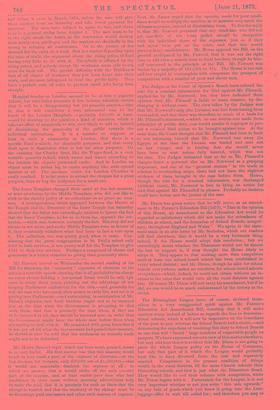Mr. Henry James's reply, which has been much praised, seems
to us very feeble. His first answer was that this measure would touch so very small a part of the expense of elections,—at the last election, for instance, only £90,000 out of £1,500,000,—that it would not materially • diminish the expense at all ; to which we answer, that it would strike off the only essential part of the expense, and at least enable poor men who had confidence in their cause without securing adventitious help to make the trial, that it is precisely for such as these that the change is wanted, and that the tendency of the change must be to discourage paid canvassers and other such sources of expense. Next, Mr. James urged that the opening made for poor candi- dates would so multiply the number, as to itterease very much the ultimate expenses, instead of diminishing them. To this the reply is, that Mr. Fawcett proposed that any candidate who did not get one-fifth of the votes polled should be chargeable with his individual share of the expenses, just as if they- had never been put on the rates, and that this would' prevent fancy candidatures. Mr. Bruce opposed the Bill, on the- ground anticipated by Mr. Fawcett, that it was not the right. time to add even a minute item to local burdens, though he him- self concurred in the principle of the Bill. Mr. Fawcett was- beaten by a majority of 114 (205 to 91). The House is too rich and too stupid to contemplate with composure the prospect of. competition with a number of poor and clever men.


































 Previous page
Previous page